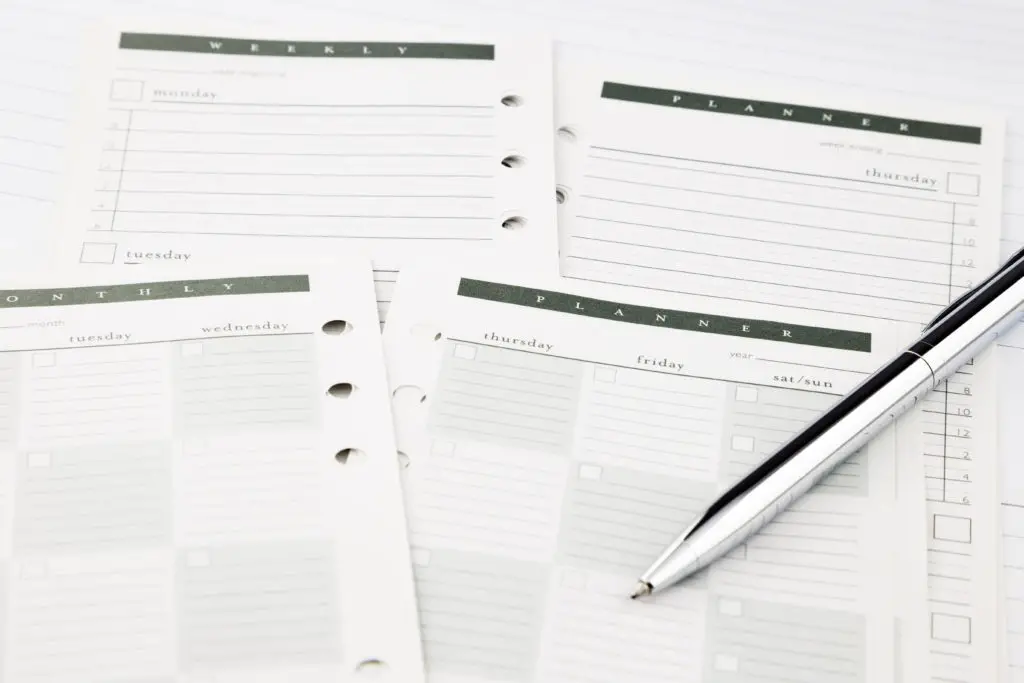Make sure you practice. You probably hear this on a regular basis. If you’re not sure where to start, you can learn practice basics here. If you already have a solid practice foundation, its time to figure out how to organize your practice in a way that makes your more efficient. Using a practice planner will allow you to accomplish more while practicing less!
This post contains affiliate links. At no cost to you, I get a small commission from each purchase you make through these links which helps keep this blog up and running.
What is a practice planner?
To put it simply, a practice planner is a planner that you use to organize your practice sessions. It takes the weekly practice log you may have used when you were younger to the next level.
An instrumental practice routine helps keep your practice sessions organized allows you to practice more efficiently and meet your goals more quickly. You can buy a practice planner, or make one yourself. It doesn’t need to be fancy, it just needs to be functional.
How do you use a practice planner?
Goal setting
Writing down your goals makes you 42 percent more likely to achieve them. Dr. Gail Matthews, a psychology professor at Dominican University conducted a study on goal setting using two hundred sixty-seven people. She found that those who wrote down their goals and dreams on a regular basis achieved them at a significantly higher level.
You can use your planner to set both long term and short term goals.
Long Term Goals
I want to make all-state
Short Term Goals
Memorize 12 Major scales
Master level 4 in Sight Reading Factory
Pass off 10 etudes in my etude book
Reflect on why you want to learn
Its important to know why we want to get better at performing music. This is what keeps you motivated and will help pull you out of a practice rut. You can use your practice planner as a journal to keep you motivated. Ask yourself questions such as: Why do I want to learn music? Who is someone who inspires me? How will working on technique make me better? This list of journal prompts can help get you started.
Record your weekly lesson assignments
How many times have you sat down to practice only to realize you have no idea where to start. Writing down your assignments as soon as your teacher gives them to you will help you to remember what you are supposed to be working on and give you a jumping off point to organize your practice.
Outline your daily practice
It is difficult to get through your entire weekly lesson assignment in one practice session. After your lesson, sit down with your weekly assignment and start to map out how you are going to learn everything on the assignment list. Planning your practice allows you to see what you have accomplished and what you still need to work on. Use this free printable practice planner to make sure you plan an even mix of warm-ups, technique, and repertoire.
Log your practice hours
A study by Anders Ericsson shows that it takes 10,000 hours of deliberate practice to master a skill. Think about logging your practice time as putting a deposit into your practice bank account. Logging your practice time will allow you to see exactly how much you are practicing and keep you accountable. It will quickly let you know if you had a low practice week and it fun to watch those hours add up.
Plan for your future practice
At the end of each practice session, note what went well and what still needs improvement. Use this information to plan out your next practice session. You can plan sessions one day at a time or you can plan them a full week at a time to make sure you cover all of the assigned materials. If you are planning them one day at a time, don’t forget to look back at your weekly assignments to make sure you get to everything.
What planner should you use?
There are hundreds of planners out there you can purchase or you can make your own to fit your personal needs.
- Practicing is for the Birds is a great planner for beginners and takes all the guesswork out of organizing your practice session. Each planner is designed to be used over 54 weeks and is made of quality paper with a spiral binding. Each page organizes your weekly practice into Warm-ups, Scales, Repertoire/exercises, and Other. You or your teacher can assign an amount of time to practice each category and you can check off each day you practice the exercise. The back of each page is staff paper
 look inside look inside | Practicing Is for the Birds — The Ultimate Practice Organizer with Reward Stickers The Ultimate Practice Organizer with Reward Stickers. Composed by Susan Pascale. Accessories; Method/Instruction. Accessories. Alfred Music #98-967513720. Published by Alfred Music (AP.98-967513720). |
- 10,000 hour practice planner is for more advanced students. Each planner is designed to be used over three months and is loosely based on Ericsson’s study (10,000 hours of practice). Each week, in addition to practice planning pages, you are given a journal prompt to reflect on why you are working toward your 10,000 hour goal. If you are really into journaling, charts, and graphs, this planner is for you!
- This free printable musicians practice planner is a great jumping off point. You can print off copies to keep in your music binder so that all of your practice materials are in one place.
- A bullet journal or composition notebook can help you customize your practice planner to fit your specific needs. You can keep it simple or get as creative as you want…the possibilities are endless.
Get Planning!
Lets face it, most students don’t have 4 hours a day to dedicate to practice so it is important to make your practice as efficient as possible. Whether you use a planner you purchased or make your own, a practice planner will help you organize the music you need to learn in a manner that will help you learn it faster. Less practice and more material mastered is a win win for everyone!


Pingback: How To Be Successful At Distance Learning - 8 Tips For Guaranteed Success - Dr. Lawson's Music Studio